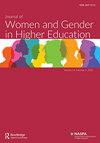Chicana Graduate Students’ Decolonization and Healing from Educational White Supremacy: A Nepantlera Approach to their Scholarly Writing
Q2 Social Sciences
Journal of Women and Gender in Higher Education
Pub Date : 2023-07-03
DOI:10.1080/26379112.2023.2205147
引用次数: 0
Abstract
Embedded misogyny and white supremacy in higher education have resulted in Chicana graduate students experiencing education-based traumas. Furthermore, hegemonic values related to what is considered “noteworthy” and “publishable” in academia are heavily influenced by racism, sexism, and misogyny, further oppressing Chicanas intending to pursue academic careers. Therefore, Chicanas’ journeys as graduate students and scholars must be understood within the context of their experiences with and methods of healing from educational white supremacy. Given our lived experiences as Chicana scholars, mujeristas, and poderosas, this article results from our commitment to supporting the healing and decolonizing of future Chicana scholars. Inspired by our respect and value of Gloria Evangelina Anzaldúa’s (1942–2004) work, we developed a decolonized healing approach to academic writing centered on her Nepantla Theory. This article is structured into the following areas—first, we present the guiding theory of nepantla and subsequent nepantleras; next, we explore the influence of educational white supremacy on the academy, scholarship, and Chicana’s experiences as graduate students and scholars; and finally, we introduce a nepantla-inspired scholarship and writing (i.e., autohistoria, nos/otras, and bodymindspiritsoul) centered on decolonization, healing, and transformation to nepantleras. We end with recommendations and a message for future Chicana scholars.Chicana Graduate Students' Decolonization and Healing from Educational White Supremacy:他们的学术写作中的尼泊尔式方法
高等教育中根深蒂固的厌女症和白人至上主义导致奇卡娜族研究生经历了基于教育的创伤。此外,学术界关于 "值得注意 "和 "可发表 "的霸权价值观也深受种族主义、性别歧视和厌女症的影响,这进一步压迫了打算从事学术职业的奇卡纳人。因此,我们必须结合奇卡纳人在教育领域的白人至上主义的经历和治愈方法,来理解他们作为研究生和学者的心路历程。鉴于我们作为奇卡娜学者、女权主义者和女权主义者的生活经历,这篇文章是我们致力于支持未来的奇卡娜学者治愈创伤和去殖民化的结果。受我们对格洛丽亚-伊万吉丽娜-安萨尔杜亚(Gloria Evangelina Anzaldúa,1942-2004 年)作品的尊重和重视的启发,我们以她的 Nepantla 理论为中心,开发了一种非殖民化的学术写作愈合方法。本文的结构分为以下几个方面--首先,我们介绍了 nepantla 的指导理论和随后的 nepantleras;其次,我们探讨了教育中的白人至上主义对学院、学术以及 Chicana 作为研究生和学者的经历的影响;最后,我们介绍了受 nepantla 启发的学术和写作(即 autohistoria、nos/otras 和 bodymindspiritsoul),其核心是去殖民化、治愈和向 nepantleras 转变。最后,我们向未来的奇卡娜学者提出建议和寄语。
本文章由计算机程序翻译,如有差异,请以英文原文为准。
求助全文
约1分钟内获得全文
求助全文
来源期刊

Journal of Women and Gender in Higher Education
Social Sciences-Gender Studies
CiteScore
1.40
自引率
0.00%
发文量
20
 求助内容:
求助内容: 应助结果提醒方式:
应助结果提醒方式:


